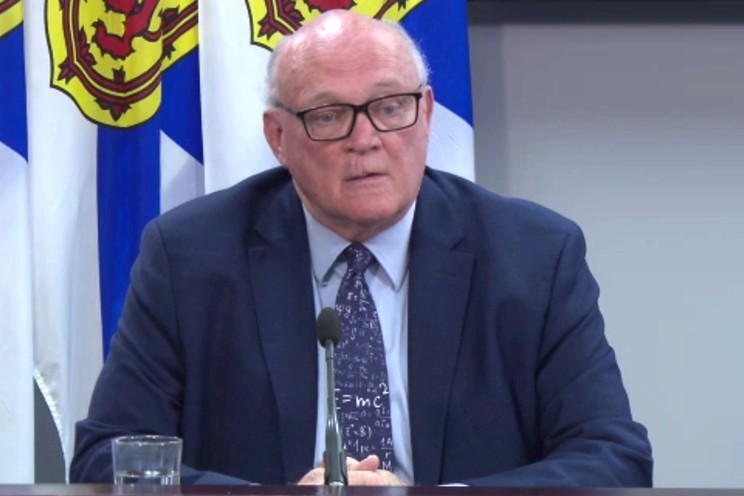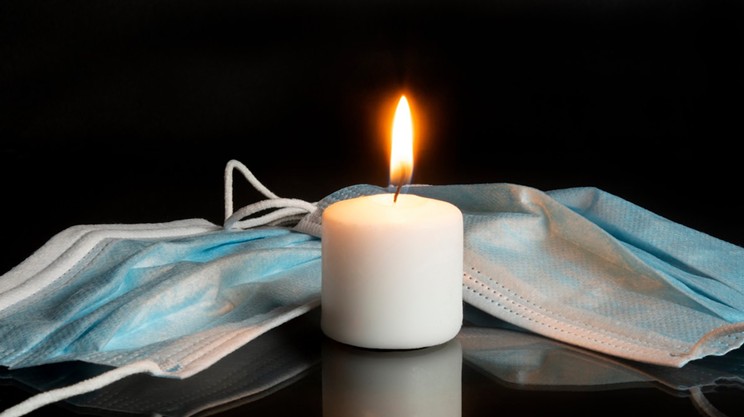In the early months of the COVID crisis, Dr. Robert Strang's daily briefings were a popular and vital source of information for Nova Scotians. Today, Dr. Strang gave his final briefing of the epidemic, announcing the lifting of the province's last lingering COVID restrictions and stating that COVID's become an endemic disease akin to the flu.
“Earlier this month the World Health Organization stated that COVID-19 no longer requires a globally coordinated emergency type response,” Nova Scotia's chief medical officer of health told reporters gathered Tuesday on Zoom and in the province's downtown Halifax media room. “This means that we no longer need a specific COVID-19 response plan, so we are transitioning to include COVID-19 in our broader respiratory illness plan.”
Wearing an understated—for Strang—"E=mc2" tie that matched his dark blue suit jacket, Strang's tone was typically matter-of-fact with no hint of celebration or trepidation about this latest turn on our C19 journey, which has killed 865 Nova Scotians so far. In practical terms, as outlined in a provincial press release, the big change is that as of May 23 the Health Protection Act Order that legally empowered public health’s COVID restrictions is lifted.
“If something happens or there's suddenly a new virus, then we need to go back to a new public health order,” Strang explained. “It doesn't take away our ability to do that. But we no longer have need to have the existing order in place” given that the chance for a COVID recurrence is now “extremely low.”
The province is also removing its vaccination rules in high-risk health settings, and requirements around disease management in long-term care facilities. That doesn't mean there are no COVID precautions or regulations in such health-care settings, but that the individual facilities are now responsible for setting their own policies.
The way the province shares COVID information is changing, too. From daily reports during the height of the emergency, to weekly reporting when the epidemic became less severe, this Thursday will be the last weekly report before a short stretch of monthly COVID reporting begins. Then, in October 2023, COVID won't get its own report but will be bundled into the province's Respiratory Watch reports along with flu, RSV and any other respiratory viruses of concern, marking COVID's transition to a disease that's endemic—going through active and quiet phases during the year—instead of being a constant threat.
Late last year, Strang gave The Coast his predication that COVID would become epidemic at some point this year: “I think in all likelihood, we're going to get to a place in 2023 where we can say, yeah, the pandemic is over.”
Now that his prediction has come true, Strang made clear during today's briefing that endemic COVID doesn't mean the end of the disease. “We now start to live with COVID, like we do with other respiratory viruses, in an ongoing endemic state,” he said. The WHO ending the global emergency and Nova Scotia winding down the COVID response “should not not be interpreted that the virus is gone.”
The province still wants people at the “highest risk of severe illness” to get the latest COVID vaccine booster now. Strang expects NACI—the National Advisory Committee on Immunization—to soon issue advice on a fall COVID vaccine for mass use, which would probably roll out a lot like the annual flu shot.
And in some respects, Strang's message hasn't changed at all in the 1,164 days since he announced Nova Scotia's first known COVID cases, on March 15, 2020—which was also the day the Health Protection Act Order came into effect. Countless times during the pandemic he gave us the well-established tips to fight COVID like any respiratory virus: wash your hands, stay home if you're sick, get vaccinated. It was advice that largely “fell on deaf ears” before COVID, he told today's briefing.
“But I hope what we've learned from our last three years of the pandemic, is that we have to show greater respect for respiratory viruses,” he said. “What I'm saying today is that we don't need the emergency response, a specific focus on COVID. But hopefully, we have generally a society that is more respectful of respiratory viruses, and collectively does the things that we need to do.
“COVID is not is gone, it's still around. We will get influenza and RSV in the fall and winter. And we need to maintain, all of us, the awareness and taking the steps that all of us can do to keep each other safe.”



